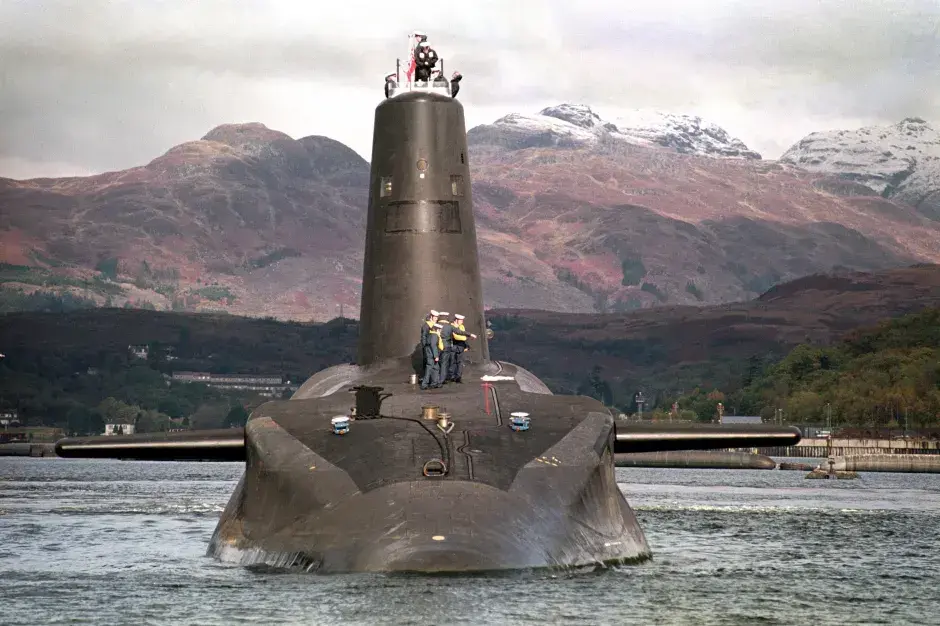Russian spy sensors have been discovered in UK waters, believed to be tracking Britain’s nuclear submarines. This alarming revelation has sparked concerns that the Kremlin may be waging a covert campaign to monitor, and potentially sabotage, critical national infrastructure.
The discovery of these sensors, some washed ashore and others detected by the Royal Navy’s minehunter ships, has been deemed a significant national security risk. While it was never made public until now, the ongoing threat appears to have been a growing concern for months.
Defence sources believe the sensors were planted specifically to gather intelligence on the UK’s four Vanguard-class nuclear submarines, which carry nuclear missiles. These submarines are a key part of the UK’s at-sea deterrent, designed to operate undetected. The discovery of Russian spy equipment tracking these vessels is a direct challenge to this vital defence strategy.
According to the Ministry of Defence, Russia’s efforts appear to be part of a larger “greyzone” warfare strategy targeting undersea infrastructure. This includes monitoring undersea cables, pipelines, and other critical assets. The UK government is particularly concerned about these threats as they could have far-reaching consequences for the nation’s power grid and communication networks.
Recent Russian activity has shown an increasing interest in UK waters. Russian ships, including the Yantar, a suspected spy vessel, were seen around key infrastructure in the Irish Sea. The Yantar, often shadowed by Royal Navy warships and RAF Poseidon spy planes, has been observed near communications cables between Dublin and Liverpool. Additionally, unmanned Russian underwater vehicles (UUVs) have been spotted operating near these cables, further intensifying concerns over Russia’s intentions.
There is also growing evidence suggesting that superyachts owned by Russian oligarchs may have been used for these covert operations. These yachts could serve as platforms for deploying underwater sensors and other surveillance equipment, adding a layer of complexity to the operations.
The issue deepens with the involvement of Russian submarines, particularly the Losharik, which is equipped for undersea sabotage missions. This submarine, one of the most modern in Russia’s fleet, is capable of operating at depths of up to 3,300 feet—far beyond the reach of conventional submarines. It is believed to have been involved in operations near UK waters in recent months, though much of its activity remains shrouded in secrecy.
The UK military has responded to these threats with increased vigilance. In March, HMS Cattistock and a Wildcat helicopter were dispatched to monitor the Admiral Vladimirskiy, a ship suspected of spying on Britain’s power supply and internet links. The Royal Navy has also been tasked with escorting Russian vessels, including a beach landing ship returning from the Mediterranean.
In response to the growing threat, the UK Ministry of Defence has outlined plans to bolster defences in the region. The newly launched Atlantic Bastion operation will deploy air, land, and sea assets to patrol UK waters and the North Atlantic. The MoD has also introduced a short-term project called Cabot, which will enhance the protection of undersea infrastructure in collaboration with private firms.
A spokesperson for the Ministry of Defence emphasised the importance of these efforts, stating: “We are committed to enhancing the security of critical offshore infrastructure. We are strengthening our response to ensure that Russian ships and aircraft cannot operate in secrecy near the UK or near NATO territory, harnessing new technologies like AI and co-ordinating patrols with our allies. And our continuous at-sea nuclear deterrent continues to patrol the world’s oceans undetected, as it has done for 56 years.”
With these growing threats in mind, military officials are working around the clock to protect the nation’s vital infrastructure, and keep the deep-sea espionage game at bay.
